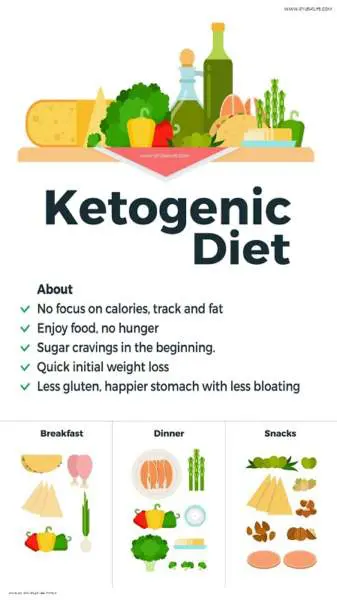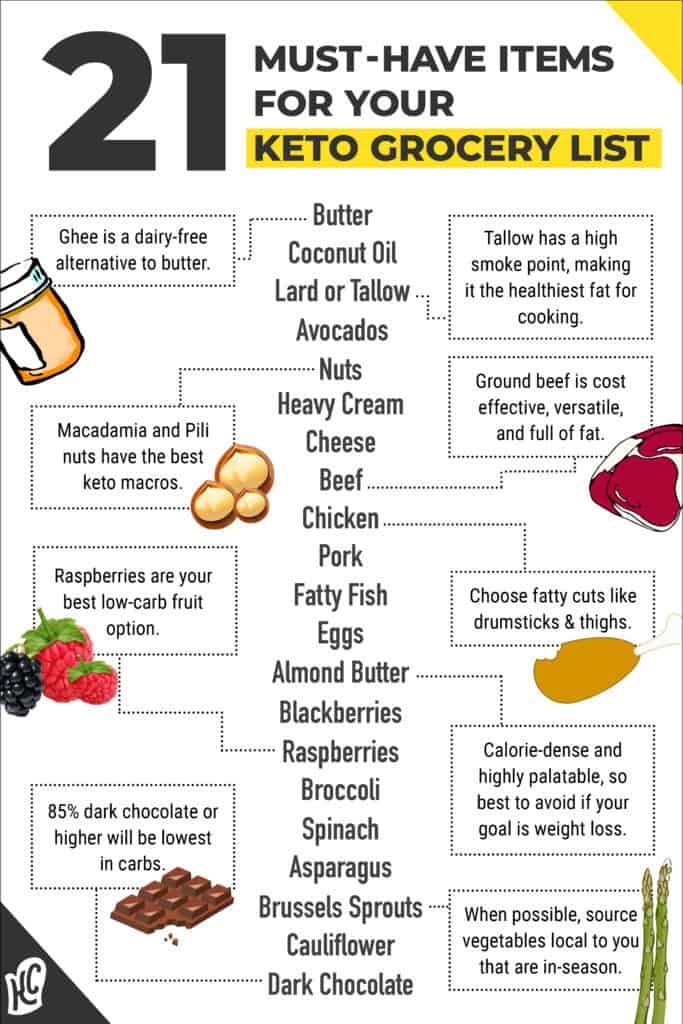Health is a vital asset for people because they do a lot of work for their livelihood. But they cannot participate in their work if they are not healthy enough.
In addition, they try hard to become slim and fit because it is very difficult for an obese person to move. Unfortunately, I witnessed this hassle when I was suffering from obesity.
Are you wondering how I got out of that hassle? It was a keto diet for weight loss, which helped me in achieving my desired goal of being healthy and fit. If you are curious about the keto diet, please read the article.
For Short Time Readers
What Is Keto Diet?
High fat, moderate protein, and low carbohydrate foods make up a ketogenic diet. After that, the body enters a metabolic condition known as ketosis as carbohydrates are lessened, and fat intake is elevated.
Then the body begins converting fats into ketones, which can give the brain energy. The body and brain get quite good at using fat and ketones as fuel instead of carbohydrates after a few days.
The Ways of Ketogenic Diet to Weight Loss

In the following ways, ketogenic diets aid in weight loss:
- Consuming More Protein
Some ketogenic diets enhance protein consumption, which has various weight loss advantages.
- Increased Fat Burning
Several studies have suggested that keto diets can moderately boost how much fat you burn while at rest, during regular activities, and exercising.
- Increased Insulin Sensitivity
Ketogenic diets can significantly increase insulin sensitivity. And this increased Insulin sensitivity can enhance metabolism and fuel usage.
- Suppressing The Appetite
Ketogenic diets make you feel satiated. Changes in the hunger hormones leptin and ghrelin provide evidence in favor of this.
- Gluconeogenesis
Your body turns protein and fat into carbohydrates for energy. This technique could burn a lot more calories every day.
Reasons Why The Keto Diet Does Not Cause Weight Loss
There are some reasons for not losing weight despite doing keto diets. The reasons are:
- Failure to Enter Ketosis
On the keto diet, people frequently fail to lose weight because they have not entered ketosis. Not reducing carbohydrates to a sufficient extent is the most frequent cause of failure to enter ketosis.
A study found that people should consume only 5–10% of their calories from carbohydrates. More specifically, the majority of ketogenic diets ask for restricting daily carbohydrate intake to 20 to 50 grams.
- Overconsumption of Protein
Numerous low-carb diets permit a moderate intake of protein. But sometimes, people think the keto diet means a low-carb, high-protein diet.
In addition, this kind of diet will not likely result in ketosis because the body can break extra proteins down into amino acids and turn them into different kinds of sugar. Someone is unlikely to enter ketosis if they take more than 35% protein.
- Eating Too Many Acceptable Carbohydrates
Numerous carbs, including dairy and nuts, are permitted on the ketogenic diet. These foods are a wonderful supplement to the keto diet, packed with fat and nutrients.
But they also have carbs. Consuming excessive amounts of these meals will prevent someone from entering and staying in ketosis.
- Consuming Alcohol
Wine and beer are two examples of alcoholic beverages containing many carbs. These kinds of alcohol are generally not permitted on the ketogenic diet. So, drinking alcohol can stop you from losing weight.
- High Anxiety
Living under stress might also prevent someone from losing weight when following the keto diet. Stress can alter hormone levels, resulting in weight gain or making it more difficult to lose weight.
A Complete List of Ketogenic Diet Foods

Here are some top foods to consume while on the keto diet, along with portion amounts.
- Coconut Oil
1 tbsp of coconut oil contains 116 calories, 0 grams of net carbohydrates, 0 grams of protein, and 14 grams of fat.
- Oil of Avocado
One tablespoon (tbsp) of avocado oil contains 124 calories, 0g of net carbohydrates, 0g of protein, and 14g of fat.
- Heavy/Dark Cream
1 tbsp of heavy cream has 52 calories, 0 grams of net carbohydrates, 0 grams of protein, and 5 grams of fat.
- Butter
100 calories, 0g protein, 0g net carbohydrates, and 11g fat are contained in 1 tbsp of the food.
- Eggs
There are 77 calories, 6g of protein, 1g of net carbohydrates, and 5g of fat in 1 egg.
- Thigh of Chicken
318 calories, 32 grams of protein, 0 grams of net carbohydrates, and 20 grams of fat are contained in 1 serving of thigh.
- Beef Ground
A 3-ounce (oz) portion, measured in raw form, contains 279 calories, 12g protein, 0g net carbohydrates, and 24g fat.
- Cauliflower
25 calories, 2 grams of protein, 2 grams of net carbohydrates, and 0 grams of fat are contained in 1 cup of raw cauliflower.
- Avocado
160 calories, 2 grams of protein, 2 grams of net carbohydrates, and 15 grams of fat per serving of a half avocado.
Foods to Avoid in Ketogenic Diet
On a ketogenic diet, you should avoid meals high in carbohydrates, both sweet and starchy. Items to avoid eating include:
- Cereal.
- Fruit juices.
- Rice and pasta.
- Sugar and sugar-containing products.
- Baked goods such as cookies and cakes.
- Pancakes, bagels, muffins, tortillas, and bread.
- Processed foods
Health Benefits of Ketogenic Diet
You may ask, “Is the keto diet for weight loss only?” The answer to your question is no; it can also benefit your other health. However, the health benefits of a keto diet are:

- Epilepsy
According to research, a ketogenic diet may help epileptic children experience a noticeably lower number of seizures.
- Cardiac Disease
The ketogenic diet can lower blood sugar, improve cholesterol levels, and reduce body fats, which are the heart disease risk factor.
- Diabetes
Keto has considerable advantages for persons with type 2 diabetes, including increased insulin sensitivity and weight loss.
- Injury to The Brain
According to a study on animals, keto can help the brain heal after a brain injury and after a stir.
Side Effects of Ketogenic Diet
Besides the health benefits of a ketogenic diet, several short-term and long-term side effects exist. The short-term side effects are:

- Extreme thirst.
- Urinating frequently.
- Fatigue and hunger.
- Anxiety, uncertainty, and agitation.
- Tachycardia.
- Unsteadiness and dizziness.
The long-term effects are:
- Kidney stone.
- Fractured bones.
- Gastrointestinal disease.
- Constipation.
- Mineral or vitamin deficits
- Liver steatosis.
- Athletic Performance Drops.
Frequently Asked Questions
How Much Weight Can I Lose in One Month by Doing Keto Diet?
You can lose 10-12 pounds in one month.
Will My Muscular Mass Decrease?
Any diet carries some danger of reducing muscle mass. Ketone levels and a high protein diet, especially if you strength train, can reduce muscle loss.
How Much Weight Can I Lose in A Week by Doing Keto Diet?
You can lose 1 pound (0.5 kg) to 10 pounds (5 kg) or more during the first week.
How Long Must I Follow The Keto Diet Before I Begin to Lose Weight?
You should generally maintain a daily caloric deficit of about 500 calories. After between 10 and 21 days, you will start noticing weight loss.
What Amount of Water Should I Take While Doing Keto?
It is advised that Keto dieters choose to drink at least 64 ounces of water each day.
How Long Should A Keto Diet Be Followed?
You should follow a keto diet for 3 to 6 months.
Final Thoughts
To conclude my research on the keto diet for weight loss, I recommend you be cautious before taking food. You should not take whatever you want to take without thinking about its effects.
As health is a vital asset, you need to think about your health. And in the case of the keto diet, you have to be more careful while taking food because the wrong selection of foods can harm your health.
However, I have researched this article only for you so that you can gather some information regarding the keto diet.




